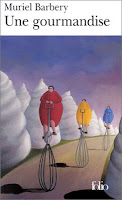This is one of those books I read after I've first read about the author, and have become intrigued by their personality. Une gourmandise by Muriel Barbery, is the first of the two books the author has written, before giving up writing and moving from France to Japan.
The book covers the last days of a famous food critic and his attempt to remember a type of food from his childhood which should epitomise the absolute "taste". It is a very long journey down memory lane, with detailed descriptions on his first / best experience with all staples of cooking: from the humble tomato, to the multi-tasking bread, to the fresh sushi... Together with his re-discovery of past dishes in his life, we also encounter his "entourage", thereby getting to know his real character, which is far from nice.
I found Barbery's writing style and technique very good, which makes it easy and relaxing to read this book. I could not, however, find the content was that exciting, even though I consider myself a foodie. At times, I rather felt sorry for the main character, who would regard food as his only pleasure in life - the proof is that nothing from all these descriptions has stayed with me.
Hidden behind all this food though, I thought I could discern the author's attempt to describe the different aspects of our lives and that of those around us, and how the two intertwine, sometimes without us knowing. She succeeds in doing so by interchanging chapters of the main character recalling his encounters with the different types of food and of the people around him and how they regard him, offering thus a peek into this personality - pleasure (of food) and pain (of the person). I particularly found the chapters of the family members very moving, referring to the love/hate relationship towards the main character.
One of the most memorable quotes in the book is actually the end: "la question ce n'est pas de manger, ce n'est pas de vivre, c'est de savoir pourquoi" (the question is not (just) to eat or to live - it is to know why)
All in all, it was a pleasant book - I will however reserve judgement on the author until I've read her second book, L' élégance hu hérisson (The Elegance of the Hedgehog), which I'm told is extraordinary.
(This was the second book I read in French and I'm now confident that I can try more difficult books in that language!)
The book covers the last days of a famous food critic and his attempt to remember a type of food from his childhood which should epitomise the absolute "taste". It is a very long journey down memory lane, with detailed descriptions on his first / best experience with all staples of cooking: from the humble tomato, to the multi-tasking bread, to the fresh sushi... Together with his re-discovery of past dishes in his life, we also encounter his "entourage", thereby getting to know his real character, which is far from nice.
I found Barbery's writing style and technique very good, which makes it easy and relaxing to read this book. I could not, however, find the content was that exciting, even though I consider myself a foodie. At times, I rather felt sorry for the main character, who would regard food as his only pleasure in life - the proof is that nothing from all these descriptions has stayed with me.
Hidden behind all this food though, I thought I could discern the author's attempt to describe the different aspects of our lives and that of those around us, and how the two intertwine, sometimes without us knowing. She succeeds in doing so by interchanging chapters of the main character recalling his encounters with the different types of food and of the people around him and how they regard him, offering thus a peek into this personality - pleasure (of food) and pain (of the person). I particularly found the chapters of the family members very moving, referring to the love/hate relationship towards the main character.
One of the most memorable quotes in the book is actually the end: "la question ce n'est pas de manger, ce n'est pas de vivre, c'est de savoir pourquoi" (the question is not (just) to eat or to live - it is to know why)
All in all, it was a pleasant book - I will however reserve judgement on the author until I've read her second book, L' élégance hu hérisson (The Elegance of the Hedgehog), which I'm told is extraordinary.
(This was the second book I read in French and I'm now confident that I can try more difficult books in that language!)

















